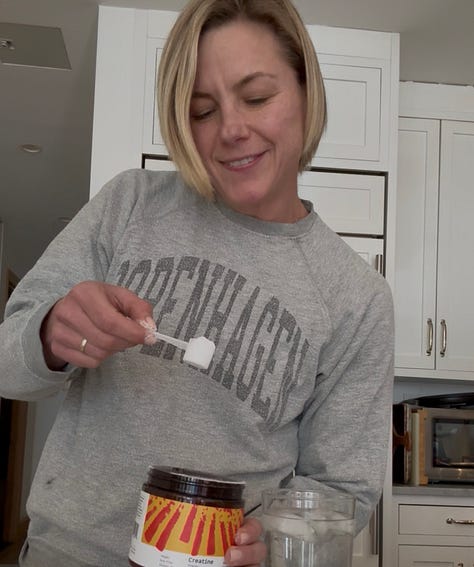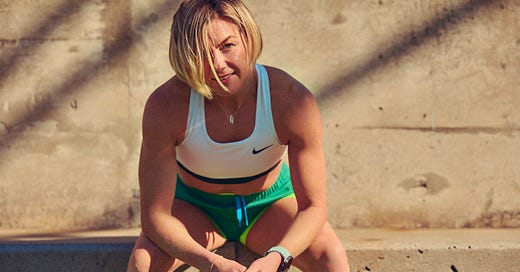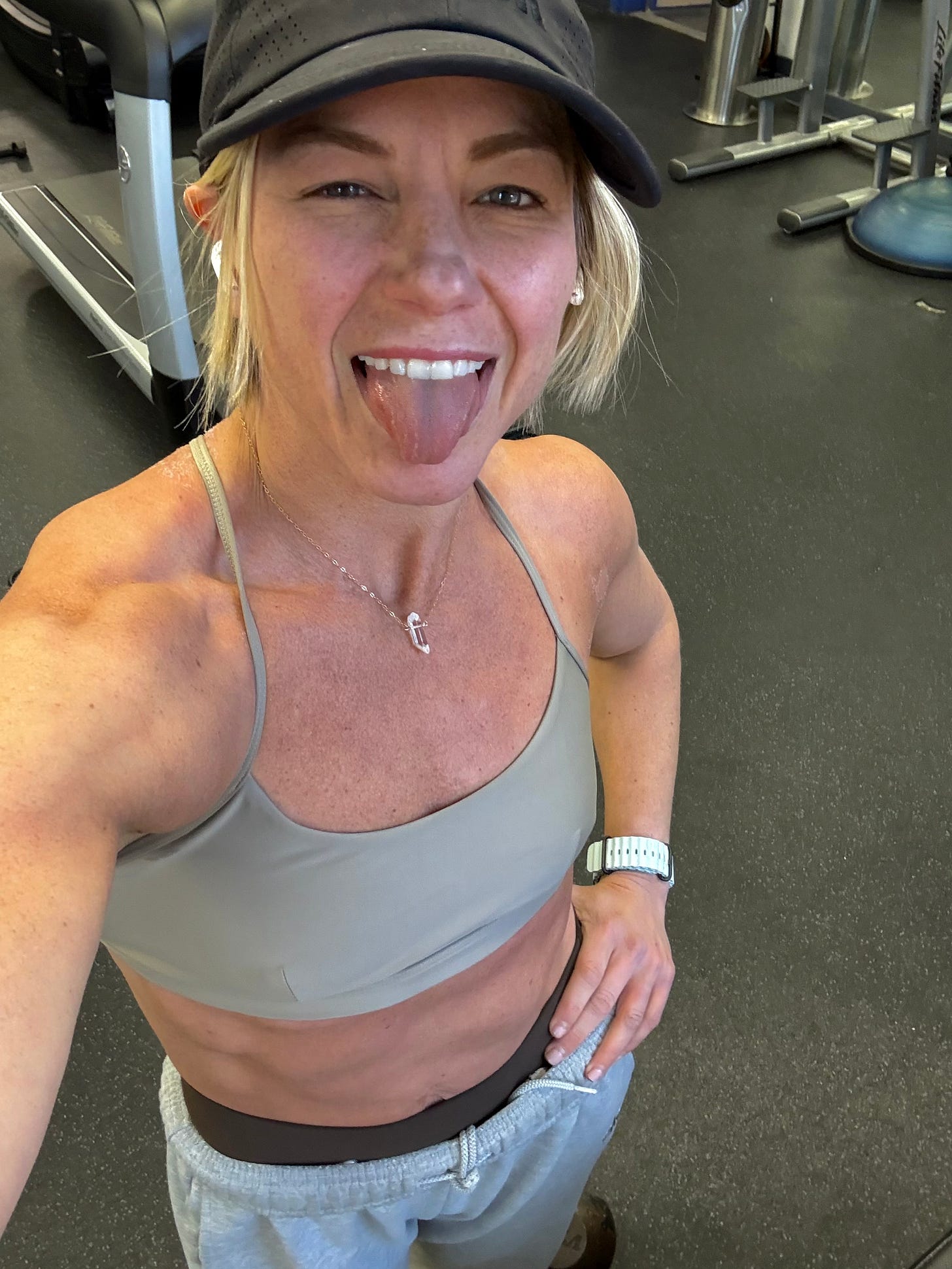I Began Taking Creatine At 43—Here's What Happened To My Body
The *definitive guide* to this supplement, including answers to your most asked questions.
My morning routine begins like this: I wake up with my 5:17am alarm, head directly to the kitchen sink to make a very large glass of cold (tap) water, add one scoop of essential amino acids and one scoop of creatine, stir, sip, finish. I immediately follow-up with a mug of coffee and healthy splash of whole milk…then out the door to strength train at my local YMCA. (In between, I’m petting and loving on my Bernese mountain dog, Willa.)
I already wrote about why I take aminos—I highly recommend you check out that post, because it blew some minds—and today, I’m diving deep into creatine.
The truth is, I wasn’t always a believer. I used to just have water and coffee in the a.m. (And those Willa snuggles.) I wasn’t looking to become a body-builder, and creatine was what my guy friends who were super-serious about lifting took, not me.
But that changed a few years ago, when I really dialed in my nutrition, and creatine piqued my interest. I started reading every study I could find about supplements, talking to scientists and researchers, and listening to podcasts on the topic.
First! Full disclosure: I am not an MD, RD or PhD. I am a curious human who has NASM personal training and nutrition coaching certifications, and who passionately loves learning about health, fitness and nutrition. Which is why I’ve spent my professional career (and personal time) writing/assigning/editing articles—plus reading studies and speaking to experts—about topics like this. I also consulted a nutritionist, Jen Silverman, RD, to fact-check me and fill-in any gaps in my reporting. (Jen and I met at the HPLT Miami women’s retreat in January, and have geeked out over nutrition together ever since.)
What Is Creatine?
Creatine is a naturally occurring compound that we produce about 1g of each day in our livers, kidneys and pancreas. Once produced, creatine is transported via our bloodstream to tissues with high energy demands, particularly skeletal muscles, where about 95% of the body’s creatine is stored. The remaining 5% is found in the brain, heart, and other organs. We use creatine for a bunch of important stuff that keeps us healthy and thriving every day. And then we excrete the waste/byproducts via our urine, in a compound called creatinine. So we need to continuously replenish it via our diets and/or supplementation.
You also get small amounts of creatine in foods like red meat and fish. Which means that unless you are vegan or vegetarian, chances are you’re already consuming some as part of your diet.
Creatine, more famously, also helps power physical activity: It supplies our muscles with a quick source of energy—by boosting production of adenosine triphosphate (ATP), essentially rocket fuel in the body—especially during short-burst, high-intensity exercise.
Women, especially in midlife (hi, I’m about to turn 46-years-old) often have lower natural creatine stores than men due to differences in our muscle mass, as well as our diets.
During perimenopause and once we’ve hit menopause, when women navigate symptoms like brain fog, mood swings, fatigue, plus age- and hormone-related muscle loss, creatine can be a game-changer, as you will learn below. Supplementation guarantees that we have enough in our body to fuel not only our muscles during workouts, but also our brains, bones, and overall cellular health.
The reason I take creatine is because it’s been studied extensively, and research shows that this science-backed supplement supports longevity, lean muscle mass, energy levels, and brain health. It’s safe, it’s effective, and it’s easy to incorporate into your daily routine. But also, it makes me feel good, in and out of the gym.
Before I get to the awesome questions that you all submitted about creatine over on my IG Stories this week, I want to share some studies that the academic community has pubbed about this supplement. Do studies exist that report minimal to zero benefits of creatine? Yes. There are, however, exponentially more gold-standard research papers that show a positive impact. In fact, there is a Creatine Conference (yes, that is a thing) happening with leading researchers in this field in Germany right now. You can watch the sessions virtually for $76. I’ll see you there. :)
Builds Muscle And Improves Strength, Performance, Energy
After 30, women naturally start losing muscle mass at an average rate of 3-8% per decade. (I know it sucks, but unfortunately I was not consulted on the rules of female aging.) “Creatine helps slow this decline, keeping muscles stronger and more resilient,” says Jen.
Women who take creatine while strength training build more lean muscle than those who don’t, according to a study in the Journal of Sports Medicine.
Creatine supplementation combined with resistance training increases lean muscle mass in older adults, particularly postmenopausal women, according to a meta-analysis pubbed in 2024 in the journal Nutrients.
This widely cited Medicine & Science in Sports & Exercise study goes into creatine’s impact on improving upper and lower body strength…the participants who supped (making that a word) with creatine didn’t fatigue as quickly, could bang out more reps, and thanks to that increase in training volume, they got stronger than the control group. Basically? It helps you get after it, even when you don’t wanna.
Creatine supplementation enhances power output and exercise performance in women, even those not engaged in high-intensity training, according to a study in the Journal of the International Society of Sports Nutrition.
Supports Bone Health
During mid-life, especially from age 55 onwards, women are at higher risk for osteopenia and osteoporosis. (I’m really excited to write about this topic soon, because I just got a DEXA scan and learned so much. It was very illuminating.) A variety of studies suggests creatine helps improve bone density, when combined with resistance training. Check out this roundup of the literature over at the Gatorade Institute.
Sharpens Cognitive Function & Memory
Creatine isn’t just for muscles—studies show that it’s good for our brains, too. There’s been a good amount of research, specifically on woman (let’s gooo!), which suggests it enhances memory and focus, especially in females navigating stress or experiencing sleep deprivation.
On the note of sleep deprivation: Taking a higher dose of creatine the day after a poor night’s sleep can help relieve brain fog and grogginess, per a very rad recent study in Scientific Reports. (I need to try this.)
Creatine has been found to support brain function in aging populations, helping counteract cognitive decline and neurodegenerative diseases, according to a study in the journal Frontiers in Nutrition. [Important note: This meta study—an analysis of the existing body of solid, existing research—notes that existing studies are small…and more research is needed.]
Perimenopausal women who took creatine experienced better verbal memory and reduced brain fog symptoms after 16 weeks of creatine supplementation, per research in the journal Nutrients.
Emerging Emotional Benefits
When combined with talk therapy over eight weeks, taking creatine substantially lowered symptoms compared to the group taking a placebo plus doing talk therapy, according to a fascinating new study in the journal European Neuropsychopharmacology.
Creatine supplementation enhanced the effectiveness of antidepressant treatments in women with major depressive disorder, found a study in Translational Psychiatry.



Back To My Creatine Journey
A few years ago, when I got increasingly serious about lifting, I simultaneously became a sponge, soaking up everything I could about how nutrition and supplementation could support my training. As I learned more and more about creatine, I decided to add a 5g scoop of the powder to my morning routine. After all: It was extensively studied, it was safe, so it couldn’t hurt…and best case scenario? It would help me feel even better.
I estimate that after three weeks of diligently taking creatine with my morning glass ‘o water, I began to notice a difference in how I felt. My big deadlift days didn’t knock me out with soreness like they had been. I could pick up a heavier kettlebell. I felt stronger, more confident, more badass in general.
I also noticed changes in my reflection in the mirror…definition in my arms and abs. And yes, that part was motivating, too! You’re allowed to think your body is cool.
This was not a perfect experiment, obviously, because (1) I am not a scientist, and (2) I was not being monitored in a lab. Plus, (3) I made several lifestyle shifts all at once: aminos, creatine, heavier lifting. (Arguably, heavier lifting was a result of the first two.)
Enough about me. You have questions, and I have answers…
The Most DM’ed Questions I Get On IG About Creatine…
Thank you to everyone who has bravely DMed me over on IG about this over the years, or sent me very specific questions or concerns via my question box earlier this week.
“What Brand Of Creatine Do You Use?”
All of the supplements I take are made by Kion, an awesome, reputable brand that is third party tested and free of mold and contaminants. You can get 20% off your creatine via this link. This is not a branded post, and I make no affiliate revenue if you decide to try their creatine. But full disclosure: I am an advisor to Kion. (Because I believe in their products and love their team.)
There are lots of solid nutrition brands out there, just make sure they’re third party tested, that you get creatine monohydrate (the most studied form), and that there are no additives like caffeine.
“Will Creatine Make Me Bulky?”
Nope! Creatine helps build muscle, but it won’t suddenly turn you into a hulk. (It’s also cool if that’s your thing!) Women don’t have the testosterone levels required for that kind of body composition without very, very, very intense work in the gym and with their diets.
“Will I Gain Weight?”
I am aware that some influencers on social media say that they gained weight on creatine. I’m not doubting their experience, though it’s worth pointing out that grandiose claims and polarizing points of view, whether positive or negative, get more traction and reach on social platforms. But here’s the deal: “You’ll only gain weight on creatine if you begin consuming more calories on average,” says Jen. “Or because you put on muscle mass by also majorly upping the volume your resistance training.” (Muscle weighs more than fat.)
Creatine enables muscles to store more water, which helps them function better, allowing you to give extra effort in your workouts. “Some women notice that it makes you retain water, usually two to five pounds worth,” says Jen. “It’s like after a trip, when you may feel like, Did I gain weight on the plane? Similar to traveling, or a high-sodium meal, you may retain more water on creatine.”
You may actually lose weight because studies show that it helps people train harder and build more lean muscle mass. Additionally, muscle is more metabolically active than fat, and can help you burn more calories just living your regular life.
One more time for the people in the back: Creatine does not contribute to unwanted weight gain in women; instead, it improves hydration and muscle function, according to a 2020 review in the journal Nutrients.
“Will It Make Me Bloated Or Nauseous?”
If you have specific digestion issues or concerns, please talk to your doctor. (In fact, tell your doctor the next time you see her/him if you start taking this supplement. Even if you have no contraindications, it’s just a good practice.)
Barring a GI condition, no, creatine doesn’t cause nausea. But, bloating is definitely possible: Some people may notice they’re a little puffy after starting creatine…most find that it goes away within a couple of weeks as your body acclimates. (FWIW, this wasn’t an issue for me…if anything, I looked more cut in the early creatine days, but that could also be because it helps me work out harder and recover faster.)
If you experience bloating, try taking a smaller dose (2.5g) daily instead of 5g.
“Should I Only Take It On My Workout Days?”
Creatine works best when taken consistently. Think of it less as a pre-workout boost and more as a long-term investment in strength, energy, and brain health. You want to maximize the amount your muscles store, so your body can use it to do all of that cool stuff we talked about at the beginning of this post.
Studies show that daily creatine supplementation leads to greater benefits over time, regardless of whether you train that day or not.
“I Don’t Work Out That ‘Hard,’ When I Hit The Gym, So Do I Need It?”
It doesn’t matter what kind of training you do or how hard you do it…our muscles benefit from creatine.
“I’m A Runner, Is There Any Point To Taking Creatine?”
“Cardio is still working your muscles,” says Jen. “And your heart is a muscle!”
“Will It Make Me Jittery?”
No. (This is a common side effect of using a pre-workout powder, which is a different thing entirely. I’ve tried that, too, and personally do not like the trembly/tingly feeling…some people love it, just depends.) If you feel jittery on creatine, consider how much coffee/tea/caffeine you’re having. Or, are there are other things happening in your life (sleep, stress, etc.) that might be agitating you? All good things to discuss with a medical provider.
“Will It Cause Kidney Issues?”
When you take a creatine supplement, your muscle stores become more saturated, which can lead to slightly higher creatinine levels in your urine. However, this does not mean you have kidney damage—research has shown that creatine supplementation is safe for healthy individuals, as long as kidney function is normal. Again: Please talk to your doctor, and get a blood panel done if either of you have any concerns.
“When Is The Best Time To Take It?”
“It’s kind of like birth control,” says Jen. “The best time to take it is whenever you’ll remember to take it.”
“What Is The ‘Loading Phase’ I’ve Heard About?”
It takes a week or two—and you gotta take it every day, consistency my friends—to build up in your body and make an impact. For that reason, some people looking to fast-track the effects will take a higher initial dose, then come down to 5g after a week or so. It’s a personal choice: I just did 5g every morning from the get-go.
“Is Pill Form Okay? Gummies?”
Pills? Totally fine. Gummies? Eh, I am not a fan of them as a vehicle for delivering nutrients, supplements, vitamins…extra sugar, difficult to verify amounts of ingredients, etc.
“What If My GP Says There’s No Reason For Me To Take It?”
I would never, ever suggest you do something that does not align with the care plan that you and your doctor have discussed together.
Exactly How to Take Creatine
Dose: 5 grams per day.
Best Form: Creatine monohydrate, because it’s the most researched.
Mixing: The powder dissolves well in water. And yes, you can absolutely toss a scoop into your smoothie. Also, yes, it is perfectly fine to take creatine with a hot beverage like coffee or tea. (I looked into this because I’m asked about it every so often.) Heat does not degrade creatine monohydrate, so mixing it into a warm drink won’t reduce its effectiveness. Just make sure to stir well, as I find it can get clumpy/dissolve less efficiently in hot liquids.
Did we do this supplement proud with this trip down every rabbit hole I (and you!) could think of? I hope so. For those of you who have tried creatine, what has your experience been like? And also: What supplement would you like me to tackle next? Let me know in the comments.
Don’t click away without giving this post a heart/like below; I love external validation. (Seriously though, it helps Best Case Scenario get more visibility on Substack.) Thank you so much for reading. I appreciate you!








My daughter (who lifts) told me about creatine about a month ago. I have in past six months undertaken a heavy metal & gut detox (supervised by my integrative doctor). Changed gyms, started focusing on weight training & consistent training cardio & pilates. I feel better than I have my entire life & I am fitter. I started creatine this morning. I am 52 YO, peri meno.
Good stuff! I am 51 and have been taking creatine for 3 years now. I also use collagen and have been for 8 years and magnesium spray for 12 years. I take them with me when traveling to never miss a day. I run a lot, lift weights 4-5 days a week, and am “lifestyle active” the rest of the time. The proof is in the results…you look strong! The results come from a consistent pattern. Strong is the new strong, I often say jokingly (kind of.)